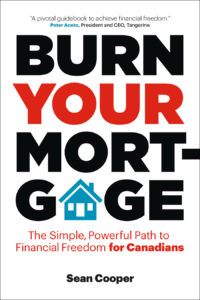Special to the Financial Independence Hub
Five years ago I read Jonathan Chevreau’s financial novel, Findependence Day, and it changed my life forever.
One of the central themes of the book is that the foundation of Financial Independence is a paid-for home. I wasn’t a fan of six figures of mortgage debt hanging over my head for the next 30 years, so I aimed to pay off my mortgage as quickly as possible.
A little over a year ago I reached my goal of “Findependence” when I burned my mortgage – literally. I paid off my home in Toronto in just three years by age 30. Thanks to a stroke of luck and good timing, the story went viral, making headlines around the world from the U.K. to Australia. I received hundreds of email from people congratulating me and wanting to follow in my footsteps.
This inspired to me write my new book, Burn Your Mortgage: The Simple, Powerful Path to Financial Freedom for Canadians. With home prices skyrocketing in cities like Toronto and Vancouver, many feel like the dream of homeownership is out of reach. I’m here to tell you that it’s not. I may have paid off my mortgage in three years, but that doesn’t mean you have to. There are simple yet effective lifestyle changes that anyone — from new buyers to experienced homeowners — can make to pay down their mortgage sooner.
Some people argue it doesn’t make sense to pay down your mortgage early with interest rates near record lows. I see it differently. Instead of using low interest rates as an excuse to pile on more debt, use them as an opportunity to pay down the single biggest debt of your lifetime: your mortgage.
Here’s an excerpt from my book that looks at why you’re most likely better off paying down your mortgage instead of investing. [Editor’s Note: the official launch of the book is today.]
Why pay down your Mortgage when you can come out ahead Investing?
Some people have questioned my decision to pay down debt. Since interest rates were near a record low, I shouldn’t have been in any hurry to pay down my debt, they say. And with the household debt-to-income ratio near a record high, you may feel this way too. Low interest rates are causing many homeowners to pile on more debt. You don’t want to fall into the debt trap. I’ll show you how to buck the trend.
If the financial crisis of 2008 has taught us anything, it’s that investment returns are far from guaranteed. The uncertainty in the markets has people flocking to the real estate market, pushing home prices well beyond any increases in wages and inflation. Financial advisers may say you can expect a rate of return of 5% or 6% on your investment portfolio, but there’s no guarantee you’ll get that. That’s why I prefer the guaranteed rate of return in paying down my mortgage: I know the rate of return I’m going to get: it’s my mortgage rate.
A common argument is that it doesn’t make sense to buy a home in a big city. That renting is a lot less expensive and the way to go. As real estate blogger Garth Turner so bluntly put it, “Why would any … person want to buy a condo in Toronto or Calgary or Vancouver and actually pay twice the monthly cost than it would take to rent the same unit?”
Kevin O’Leary of ABC’s Shark Tank shares a similar view. Mr. Wonderful has gone on record saying you’d be an “idiot” to buy a home (I guess I’m king of the idiots, since I not only bought a house in a big city, I paid it off). We’re told we’d be better off renting and investing.
When it comes to the performance of real estate versus the stock market, the findings seem to back this up. The average price of a resale home in Canada was up 5.4% from 2004 to 2013. Over the same time, the S&P/TSX Composite Index posted a 7.97% return. It seems pretty clear: you’re better off renting and investing than you are buying.
Naysayers ignore the power of leverage
So why isn’t the debate over? Because it’s flawed. It ignores the power of leverage. Leverage is a fancy way of saying you’re borrowing the bank’s money to invest in something that’s expected to go up in value. You’re leveraging when the bank lets you borrow up to 95% of a home’s value.
The bank doesn’t let you borrow this much money for stocks. Why not? Because real estate is seen as a safe, long-term investment. (It’s also because of collateral. If you lose all your money in the stock market, the bank has nothing, but if you default on your mortgage, the bank can sell your home to recover some or all of its money.)
Here’s an example that shows the power of leverage: Let’s say you bought a home a decade ago for $250,000, with only 10% down ($25,000). You later sold it for $400,000, making $125,000 in profit (for simplicity’s sake, we’ll ignore associated costs such as mortgage interest, mortgage insurance, property taxes and closing costs).
Even though your home only went up in value by 60%, that’s a 500% return on your initial investment (down payment) of $25,000. Try finding that kind of return in the stock market!
 Sean Cooper is the author of the new book, Burn Your Mortgage, which helps anyone — from new buyers to experienced homeowner s— pay down their mortgage sooner and live well while doing it. Sean’s book goes on sale March 1st. Pre-order it now at Chapters and Amazon.
Sean Cooper is the author of the new book, Burn Your Mortgage, which helps anyone — from new buyers to experienced homeowner s— pay down their mortgage sooner and live well while doing it. Sean’s book goes on sale March 1st. Pre-order it now at Chapters and Amazon.



Complete misappropriation of the leverage concept! You can easily get the same return in the stock market. It’s not the market that is the difference here, whether real estate or stocks. If you borrow money to make an investment in stocks (or anything), you’re gonna get the same amazing returns!